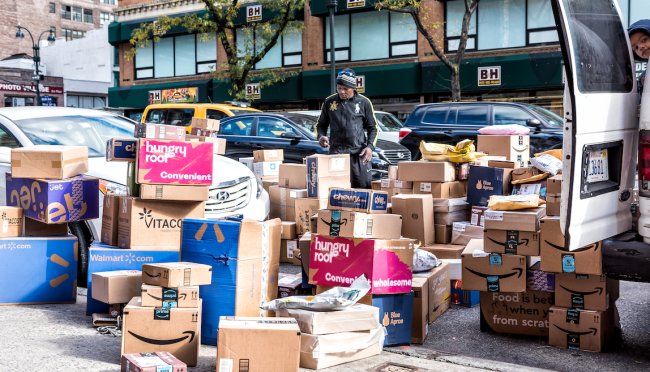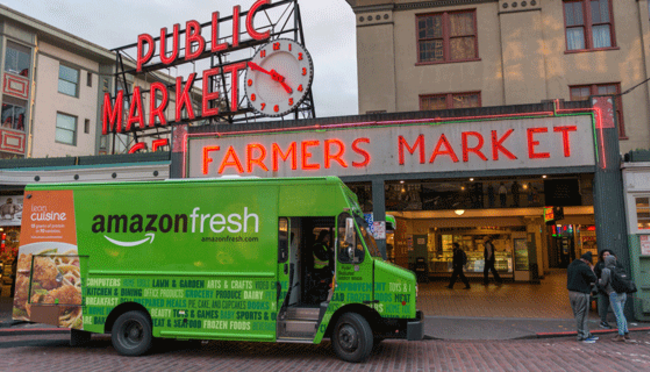Distribution →
→

- 12 Dec 2023
- Research & Ideas
COVID Tested Global Supply Chains. Here’s How They’ve Adapted
A global supply chain reshuffling is underway as companies seek to diversify their distribution networks in response to pandemic-related shocks, says research by Laura Alfaro. What do these shifts mean for American businesses and buyers?

- 25 Apr 2023
- Op-Ed
How SHEIN and Temu Conquered Fast Fashion—and Forged a New Business Model
The platforms SHEIN and Temu match consumer demand and factory output, bringing Chinese production to the rest of the world. The companies have remade fast fashion, but their pioneering approach has the potential to go far beyond retail, says John Deighton.

- 29 Nov 2022
- Research & Ideas
How Much More Would Holiday Shoppers Pay to Wear Something Rare?
Economic worries will make pricing strategy even more critical this holiday season. Research by Chiara Farronato reveals the value that hip consumers see in hard-to-find products. Are companies simply making too many goods?

- 18 Oct 2022
- Cold Call Podcast
Chewy.com’s Make-or-Break Logistics Dilemma
In late 2013, Ryan Cohen, cofounder and then-CEO of online pet products retailer Chewy.com, was facing a decision that could determine his company’s future. Should he stay with a third-party logistics provider (3PL) for all of Chewy.com’s e-commerce fulfillment or take that function in house? Cohen was convinced that achieving scale would be essential to making the business work and he worried that the company’s current 3PL may not be able to scale with Chewy.com’s projected growth or maintain the company’s performance standards for service quality and fulfillment. But neither he nor his cofounders had any experience managing logistics, and the company’s board members were pressuring him to leave order fulfillment to the 3PL. They worried that any changes could destabilize the existing 3PL relationship and endanger the viability of the fast-growing business. What should Cohen do? Senior Lecturer Jeffrey Rayport discusses the options in his case, “Chewy.com (A).”

- 10 Jan 2022
- Research & Ideas
How to Get Companies to Make Investments That Benefit Everyone
Want more organizations to give back to their communities? Frank Nagle says the success of open source software offers an innovative—and unexpected—roadmap for social good. Open for comment; 0 Comments.

- 19 Jul 2020
- Working Paper Summaries
Open Source Software and Global Entrepreneurship
Does more activity in open source software development lead to increased entrepreneurial activity and, if so, how much, and in what direction? This study measures how participation on the GitHub open source platform affects the founding of new ventures globally.
- 01 Jun 2020
- What Do You Think?
Will Challenged Amazon Tweak Its Retail Model Post-Pandemic?
James Heskett's readers have little sympathy for Amazon's loss of market share during the pandemic. Has the organization lost its ability to learn? Open for comment; 0 Comments.

- 05 Mar 2019
- Working Paper Summaries
The Impacts of Increasing Search Frictions on Online Shopping Behavior: Evidence from a Field Experiment
This paper challenges the logic that making it easier for consumers to search across a wide assortment of products is the best strategy for online retailers. Experiments show that adding extra search costs to find discounted items can improve gross margins and sales by increasing the number of items inspected and serving as a self-selecting price discrimination mechanism among customers.

- 18 Oct 2018
- Research & Ideas
How to Use Free Shipping as a Competitive Weapon
Free shipping is an increasingly important tool in the online retailer's marketing arsenal, but profit is lost when not done right, says Donald Ngwe. Open for comment; 0 Comments.

- 05 Sep 2018
- Research & Ideas
The Hidden Benefit of Giving Back to Open Source Software
Firms that allow their software programmers to "give back" to the open source community on company time gain benefits—even though competitors might benefit too, says Frank Nagle. Open for comment; 0 Comments.

- 17 Jun 2017
- Research & Ideas
Amazon, Whole Foods Deal a Big Win for Consumers
What does Amazon's $13.4 billion deal for Whole Foods say about the future of retail? Harvard Business School professors Jose Alvarez and Len Schlesinger see good times ahead for consumers as well as both companies. Open for comment; 0 Comments.
- 06 Jul 2015
- Research & Ideas
Money and Quotas Motivate the Sales Force Best
Bonus programs are effective for motivating sales people, but also costly for companies to maintain. Doug Chung and Das Narayandas study several compensation schemes to see which work best. Open for comment; 0 Comments.

- 21 May 2015
- Working Paper Summaries
Incentives versus Reciprocity: Insights from a Field Experiment
Sales force compensation is a key instrument available to firms for motivating and enhancing sales performance. What are the most effective forms of compensation? In a field experiment involving four regional sales forces of a prominent firm in India, the authors examined the impact of conditional and unconditional bonus schemes. Findings from this study provide guidance to firms on how to use conditional and unconditional compensation to enhance sales rep productivity and better manage the achievement of sales forecasts. Closed for comment; 0 Comments.
- 02 Apr 2015
- Research & Ideas
Digital Initiative Summit: The Business of Crowdsourcing
Gaining the community's trust is vital to building a successful business with crowdsourcing. Open for comment; 0 Comments.
- 17 Mar 2015
- Research & Ideas
Where Did My Shopping Mall Go?
The growing popularity of online shopping is remaking the world of offline shopping—stores are getting smaller, malls are getting scarcer. Rajiv Lal and José Alvarez look ahead five years at our radically transforming shopping experience. Plus: Book excerpt. Open for comment; 0 Comments.
- 02 Mar 2015
- Research & Ideas
Retail Reaches a Tipping Point—Which Stores Will Survive?
Part 1: The new book Retail Revolution: Will Your Brick and Mortar Store Survive? argues that ecommerce is about to deal severe blows to many familiar store-based brands—even including Walmart. Here's how retailers can fight back, according to Rajiv Lal, José Alvarez, and Dan Greenberg. Open for comment; 0 Comments.
- 29 Sep 2014
- Research & Ideas
Why Do Outlet Stores Exist?
Created in the 1930s, outlet stores allowed retailers to dispose of unpopular items at fire-sale prices. Today, outlets seem outmoded and unnecessary—stores have bargain racks, after all. Donald K. Ngwe explains why outlets still exist. Open for comment; 0 Comments.
- 08 Sep 2014
- Research & Ideas
The Strategic Way To Hire a Sales Team
The equivalent of an entire sales force is replaced at many firms every four years, so it's critical that go-to-market initiatives remain tied to strategic goals. Frank Cespedes explains how in his book, Aligning Strategy and Sales. Closed for comment; 0 Comments.
- 03 Feb 2014
- Research & Ideas
The Tricky Business of Managing Web Advertising Affiliates
Advertising through numerous website affiliates potentially helps marketers get more bang for their buck. But the far-flung systems can also lead to fraud, says Ben Edelman. What's the best way to manage your advertising network? Closed for comment; 0 Comments.

Open Source Software: The $9 Trillion Resource Companies Take for Granted
Many companies build their businesses on open source software, code that would cost firms $8.8 trillion to create from scratch if it weren't freely available. Research by Frank Nagle and colleagues puts a value on an economic necessity that will require investment to meet demand.